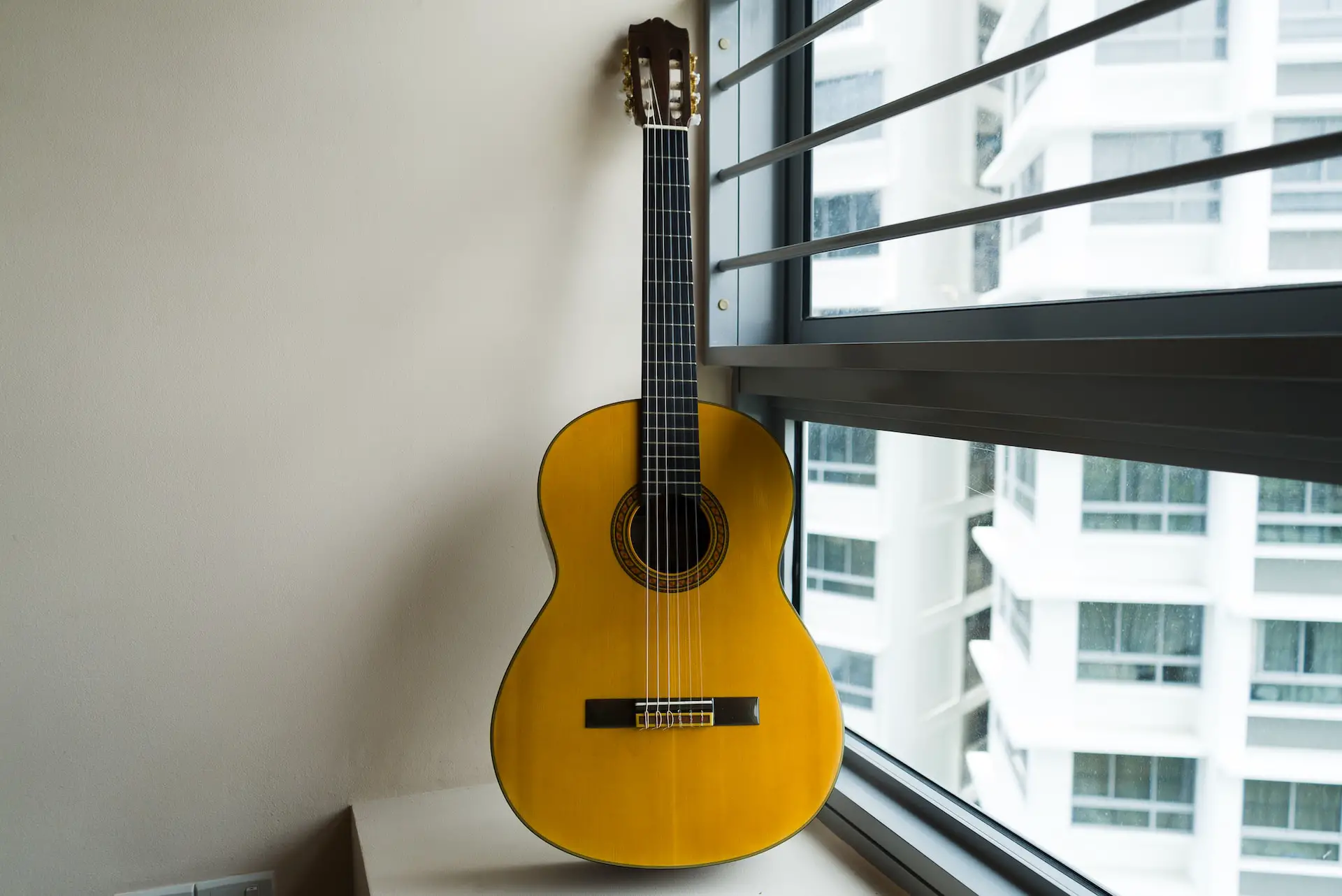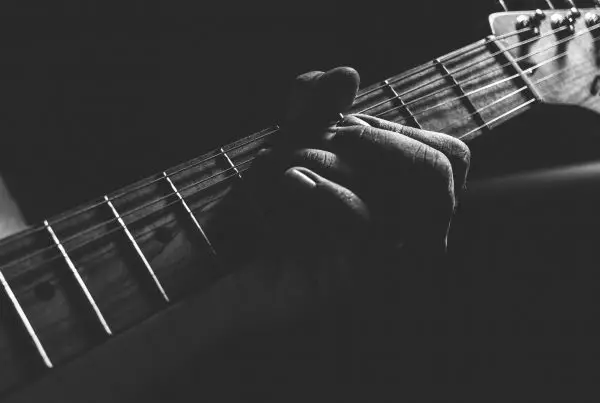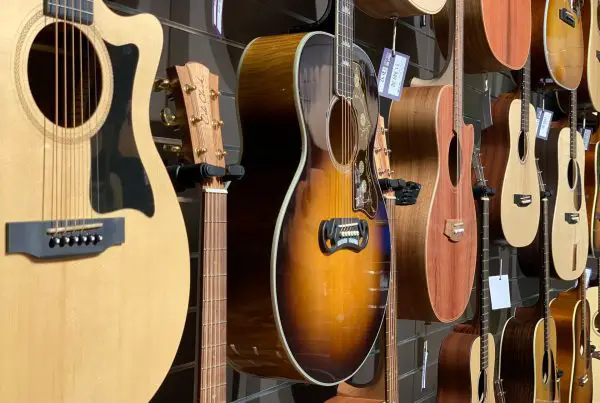Can you play jazz on a classical guitar?
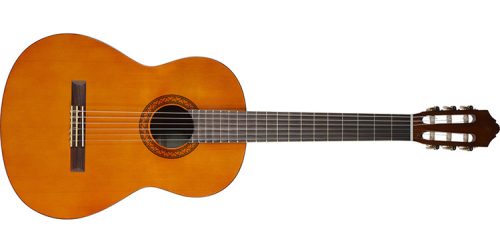
You can play jazz using classical guitar
You can absolutely play jazz on a classical guitar. While the classical guitar may not be the first instrument that comes to mind when thinking about jazz, it is versatile enough to be used in various genres, including jazz.
However, it is important to note that the classical guitar has some distinct differences from other types of guitars, such as the steel-string acoustic or electric guitar, which are more commonly associated with jazz music.
The classical guitar is known for its nylon strings, which produce a warm and mellow tone. This mellowness lends itself well to the expressive and melodic nature of jazz music. Additionally, the classical guitar has a wider neck and lower string tension compared to other guitars, allowing for more intricate fingerstyle playing and chord voicings commonly used in jazz.
To play jazz on a classical guitar, there are a few things to consider:
1. Technique: Classical guitarists often use fingerstyle playing techniques, which involve plucking the strings with the fingers rather than using a pick. This technique can be adapted to play jazz, but it may require some adjustments. Jazz guitarists often use a combination of picking and fingerstyle techniques, known as hybrid picking, to achieve the desired sound and articulation.
2. Chord voicings: Jazz music typically involves complex chord progressions and extended chords. Classical guitarists may need to learn new chord voicings and shapes to navigate these progressions. Jazz guitarists often utilize chord extensions, alterations, and substitutions to add color and tension to the harmony.
3. Improvisation: Jazz is known for its improvisation, and classical guitarists may need to develop their improvisational skills to play jazz on a classical guitar. This can include learning jazz scales, modes, and melodic patterns, as well as studying the vocabulary of jazz guitarists through transcriptions and listening to recordings.
Overall, while there may be some technical and conceptual adjustments required, playing jazz on a classical guitar is definitely achievable. It offers a unique and beautiful sound that can add a fresh perspective to the genre. So, if you’re interested in exploring jazz on the classical guitar, go ahead and dive into the world of mellow melodies and expressive improvisation.
Here’s a summary that sums up the entire article if you are too busy. Otherwise, read till the end because there are much more to the topic!
| Question | Answer |
|---|---|
| Can you play jazz on a classical guitar? | Yes, you can play jazz on a classical guitar. The warm and mellow tone of the classical guitar, along with its fingerstyle playing technique, lends itself well to the expressive and melodic nature of jazz music. |
| Can you play jazz on any guitar? | Yes, you can play jazz on any guitar. While certain types of guitars are commonly associated with jazz, such as archtop or semi-hollow electric guitars, jazz music is not limited to a specific instrument. |
| Is jazz guitar harder than classical? | It is difficult to say which is harder, as both jazz and classical guitar require different skills. Jazz guitar focuses on improvisation and harmony, while classical guitar emphasizes precise fingerstyle technique and reading sheet music. |
| What are the essential techniques for playing jazz on a classical guitar? | Essential techniques for playing jazz on a classical guitar include fingerstyle playing, mastering chord voicings, improvisation skills, syncopated rhythm, and melodic phrasing. |
| What are some famous jazz guitarists who have played on a classical guitar? | Famous jazz guitarists who have showcased their skills on a classical guitar include Jim Hall, Earl Klugh, Charlie Byrd, Ralph Towner, and Manuel Barrueco. |
| What are the advantages of playing jazz on a classical guitar? | Advantages of playing jazz on a classical guitar include a warm and mellow tone, fingerstyle versatility, expressive dynamics, unique chord voicings, and versatility in ensemble playing. |
Can you play jazz on any guitar?
You can play jazz on any guitar. While certain types of guitars are more commonly associated with jazz, such as the archtop or semi-hollow electric guitars, jazz music is not limited to a specific instrument. \
Jazz is characterized by its improvisational nature, complex chord progressions, and expressive melodies, which can be performed on a variety of guitars.
The choice of guitar for playing jazz depends on personal preference, playing style, and the desired sound. Here are some guitar types commonly used in jazz:
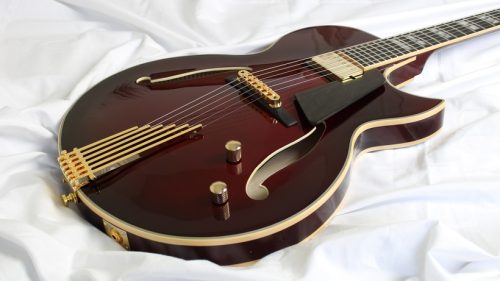
Archtop guitar is the most popular for Jazz
1. Archtop guitars: These guitars have a hollow or semi-hollow body with a distinctive curved top, which provides a warm and resonant tone. The archtop’s rich tone and excellent projection make it a popular choice for jazz guitarists. Famous jazz guitarists like Wes Montgomery and Joe Pass are known for their iconic archtop guitar sound.
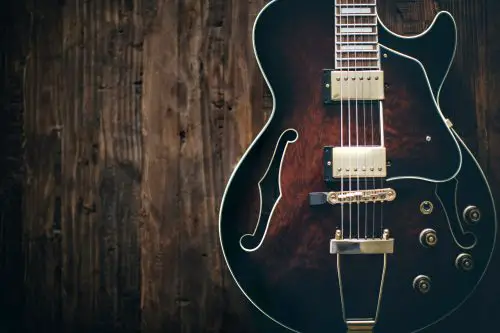
Semi hollow guitar
2. Semi-hollow electric guitars: These guitars combine elements of solid-body and hollow-body guitars, offering a good balance between sustain and acoustic resonance. They have a more versatile sound and are often favored by modern jazz guitarists who play a wide range of styles.
Also Read: Hollow Body Guitar 101: Usage, Cost, Pros & Cons (Worth It?)
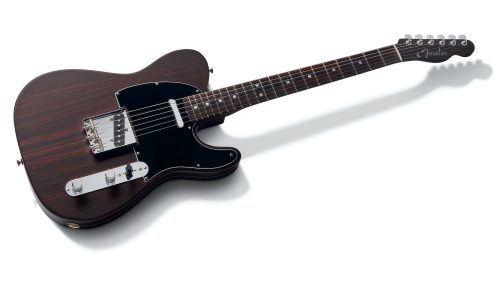
Regular solid body guitar
3. Solid-body electric guitars: While not traditionally associated with jazz, solid-body electric guitars can still be used to play jazz music. They offer a wide range of tones, especially when paired with the right amplification and effects. Many guitarists, such as John Scofield and Kurt Rosenwinkel, have successfully incorporated solid-body electric guitars in their jazz playing.

Classical Guitar with nylon
4. Classical guitars: As mentioned earlier, classical guitars with nylon strings can also be used to play jazz. Their warm and mellow tone is well-suited for the expressive and melodic nature of jazz music. However, playing jazz on a classical guitar may require some adjustments in technique and chord voicings.
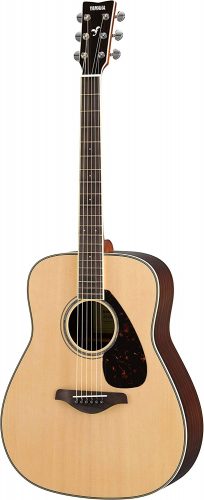
Regular acoustic guitar
5. Acoustic guitars: Acoustic guitars, both with steel strings and nylon strings, can be used to play jazz. They offer a distinct sound and can be particularly suitable for more intimate and stripped-down jazz performances.
In the end, the choice of guitar for playing jazz comes down to personal preference and the specific sound you want to achieve. Experimenting with different guitars and finding one that feels comfortable and suits your playing style can help you discover your own unique voice in jazz music. Don’t be afraid to try out different guitars and explore the possibilities that each one brings to your jazz playing.
Also Read: Rating Popular Guitars To Play Jazz (Ft. Tele, Strat, Les Paul)
Essential techniques for playing jazz on a classical guitar
To play jazz on a classical guitar, there are several essential techniques that you need to master. These techniques will help you achieve the characteristic sound and style of jazz music on the classical guitar. Here are some important techniques to focus on:
1. Fingerstyle playing: Classical guitarists are already familiar with fingerstyle playing, which involves using the fingers to pluck the strings rather than using a pick. This technique allows for greater control and nuance in the dynamics and tone production. With fingerstyle, you can develop a more expressive and melodic approach to jazz improvisation.
Also Read: Ultimate Guide to the Best String Gauge for Fingerstyle
2. Chord voicings: Mastering various jazz chord voicings is crucial for playing jazz on any guitar, including the classical guitar. In jazz, you’ll encounter complex chord progressions and extended chords. Experiment with different chord shapes and inversions on the classical guitar to navigate through these progressions. This will allow you to create rich and harmonically colorful accompaniments in your jazz playing.
3. Improvisation: Jazz is known for its improvisational nature, and the ability to improvise is a core aspect of jazz guitar playing. Developing your improvisation skills can be done by learning jazz scales, modes, arpeggios, and melodic patterns. Transcribing solos from jazz guitarists and studying their improvisational concepts can also greatly enhance your jazz vocabulary and improvisational abilities.
4. Syncopated rhythm: Jazz music often incorporates syncopated rhythms, which add a swinging and grooving feel to the music. Practice playing syncopated rhythms by accenting off-beat notes and experimenting with different rhythmic patterns. This will help you develop a sense of swing and groove in your jazz playing.
5. Melodic phrasing: Jazz guitarists strive to create melodic and expressive solos. Focus on developing your phrasing by paying attention to dynamics, articulation, and note placements. Use bends, slides, vibrato, and other ornamentation techniques to infuse your playing with expressiveness and convey your musical ideas effectively.
Remember, learning these techniques takes time and effort. Regular practice and listening to jazz recordings will help you internalize the jazz language and phrasing. Be patient with your progress and enjoy the journey of exploring jazz on a classical guitar. As you develop your skills and musicality, you’ll be able to express yourself more freely and confidently in the world of jazz guitar playing.
Famous jazz guitarists who have played on a classical guitar?
While the classical guitar may not be as commonly associated with jazz as other types of guitars, there have been notable jazz guitarists who have showcased their skills on a classical guitar. These musicians have demonstrated the versatility and unique sound that the classical guitar can bring to the world of jazz. Here are a few famous jazz guitarists who have played on a classical guitar:
1. Jim Hall: Renowned for his melodic and lyrical playing style, Jim Hall was known to occasionally play jazz on a classical guitar. His use of the classical guitar’s warm and mellow tone added a unique flavor to his improvisations and compositions.
2. Earl Klugh: A Grammy-winning jazz guitarist, Earl Klugh has incorporated classical guitar elements into his jazz performances. He is recognized for his smooth and soulful playing style, and the classical guitar adds a distinct timbre to his sound.
3. Charlie Byrd: Charlie Byrd was a prominent American jazz guitarist who gained recognition for his collaborations with jazz saxophonist Stan Getz. Byrd was classically trained and beautifully blended elements of classical guitar into his jazz repertoire.
4. Ralph Towner: A versatile guitarist and composer, Ralph Towner is known for his innovative approach to jazz and fusion music. He has explored a wide range of guitar styles, including classical, and has incorporated classical guitar techniques and influences into his playing.
5. Manuel Barrueco: Though primarily known as a classical guitarist, Manuel Barrueco has occasionally ventured into the realm of jazz. His virtuosic playing and deep understanding of both genres have allowed him to seamlessly integrate elements of jazz into his classical guitar performances.
These jazz guitarists demonstrate how the classical guitar can be utilized effectively in jazz music. Their ability to merge the expressive qualities of classical guitar with the improvisational nature of jazz showcases the versatility of the instrument. While they may not be exclusively known for their jazz performances on classical guitar, their contributions highlight the potential of blending these styles and pushing the boundaries of the genre.
Exploring the recordings and performances of these influential jazz guitarists can provide inspiration and insights into how the classical guitar can be embraced within the jazz context. It serves as a reminder that musical boundaries are meant to be challenged and transcended, leading to innovation and creating beautiful music.
Advantages of playing jazz on a classical guitar?
Playing jazz on a classical guitar offers several advantages that contribute to the unique sound and experience of the genre. These advantages can inspire guitarists to explore the combination of jazz music with the distinct qualities of the classical guitar. Here are some advantages of playing jazz on a classical guitar:
1. Warm and mellow tone: The nylon strings of a classical guitar produce a warm and mellow tone, which is well-suited for the expressive and melodic nature of jazz. This tone adds a unique richness to jazz chords and melodies, enhancing the overall ambiance of the music.
2. Fingerstyle versatility: Classical guitarists are generally adept at fingerstyle playing, utilizing their fingers to pluck the strings. This technique provides greater control, allowing for intricate fingerpicking patterns and chord voicings commonly used in jazz. Fingerstyle playing on a classical guitar allows for more dynamic expression and a wide range of articulation.
3. Expressive dynamics: Classical guitars have a wide dynamic range, which allows the player to emphasize and control the volume and intensity of their playing. Jazz is characterized by its dynamic shifts, and the classical guitar enables the guitarist to achieve nuanced dynamics, from delicate and intimate passages to powerful and driving parts.
4. Unique chord voicings: The wider neck and lower string tension of a classical guitar make it possible to play complex chord voicings with greater ease. Jazz music often requires extended chords and intricate voicings, and the classical guitar’s characteristics facilitate the exploration and execution of these chord structures.
5. Versatility in ensemble playing: Jazz guitarists often find themselves performing in various ensemble settings, such as duos, trios, or larger groups. The classical guitar’s sound projection and balanced tonal qualities make it a great instrument for jazz guitarists seeking to blend with other instruments in an ensemble setting. Its ability to fit into different musical contexts adds versatility and allows for seamless integration with other instruments.
Playing jazz on a classical guitar opens up new possibilities and textures in jazz music. It enables guitarists to bring a fresh and unique sound to the genre, while also celebrating the rich tradition of both classical and jazz music. Exploring jazz on a classical guitar can be an exciting and rewarding journey for guitarists seeking to broaden their musical horizons and express themselves in new and creative ways.
Is jazz guitar harder than classical?
It is difficult to say whether jazz guitar is inherently harder than classical guitar, as both styles require different skills and techniques. Jazz and classical guitar each have their own unique challenges, and the difficulty level can vary depending on the individual’s musical background, experience, and familiarity with the genre.
Classical guitar often emphasizes precise fingerstyle technique, with a focus on reading sheet music, executing complex finger movements, and mastering classical repertoire. The classical guitarist must develop control over tone production, dynamics, and phrasing to convey the intended musical expression. Classical guitarists also typically spend a significant amount of time practicing scales, arpeggios, and challenging classical compositions.
On the other hand, jazz guitar places more emphasis on improvisation, harmony, and rhythmic flexibility. Jazz guitarists need to develop a strong understanding of chord voicings, comping, and improvisational techniques such as scales, modes, and melodic patterns. They also need to develop their ear training skills to be able to recognize and play jazz chord progressions by ear. Additionally, jazz guitarists often need to have a solid grasp of music theory, as they may need to quickly analyze and navigate complex harmonic structures.
While both styles have their own technical and musical challenges, one can argue that jazz guitar may require a certain level of flexibility and adaptability. Jazz musicians are often expected to be able to seamlessly interact with other musicians, respond to musical cues in real-time, and make spontaneous musical decisions during improvisation.
Also Read: 5 Hardest Music Genres For Guitar: Jazz Vs Metal Vs Classic
Summary
In conclusion, playing jazz on a classical guitar is not only possible, but it also opens up a world of unique and delightful musical possibilities. While the classical guitar may not be the first instrument that comes to mind for jazz, its warm tone, fingerstyle versatility, and expressive dynamics make it a hidden gem waiting to be explored. By mastering essential techniques, such as chord voicings and improvisation, you can seamlessly blend the soulful melodies of jazz with the rich heritage of classical guitar.
So, if you have a classical guitar yearning to swing and groove, don’t hesitate to embark on this musical journey. Embrace the challenge, embrace the beauty, and let your fingers dance along the strings as you create your own jazz masterpiece on a classical guitar.
Jazz on a classical guitar – a harmonious marriage that sets the stage for musical enchantment and transports your audience to melodic bliss.


